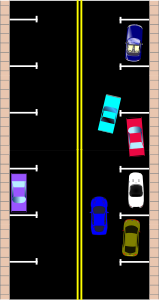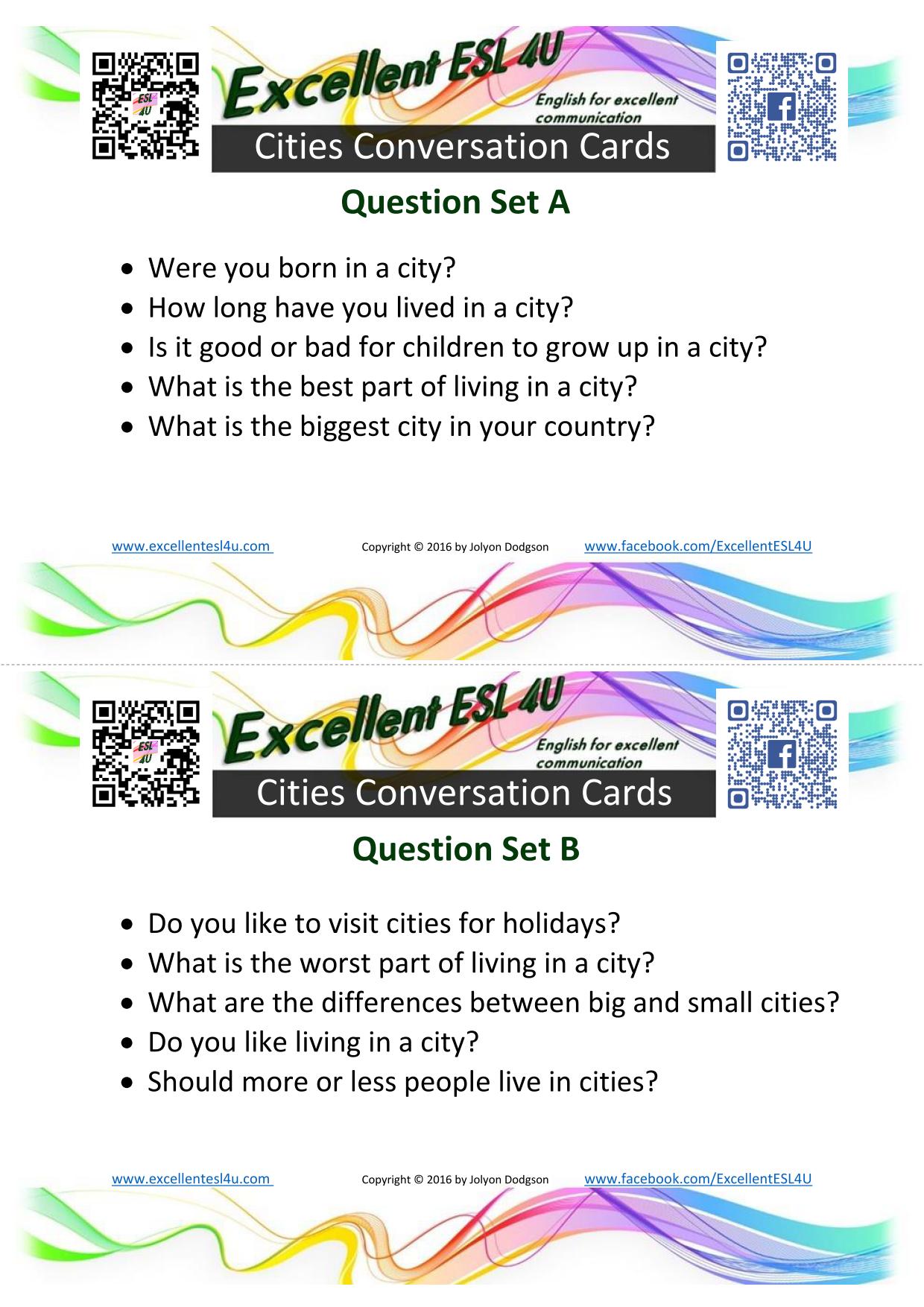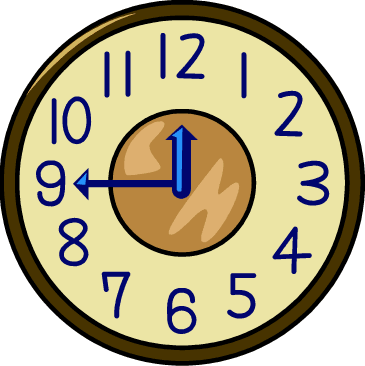ESL Cities Conversation
This ESL cities conversation page has example conversations and exercises for you to do in which you will practice speaking about cities and using vocabulary about living in a city. By doing the tasks on this page you will be able to prepare for having to talk about cities.

The first part of the page has two example ESL cities conversations in which cities vocabulary is used. You can read these to see how a natural conversation would happen. They have also been made into short cartoons that you can watch if you want to. If you do not understand any of the words that are used you can look at the ESL cities vocabulary page as this has definitions for lots of words about living in a city.
Then there are three activities for you to do. The activities are as follows:
- Fill in the blanks in a conversation.
- Write a conversation.
- Conversation topics.
Conversation 1
Situation: Jane and Bob talk about the high living cost in London.
Bob: Hi, Jane. You look upset. What’s wrong?
Jane: Well, I just had an argument with my landlord this morning.
Bob: About what? The rent?
Jane: Yes. He told me that the rent will increase by 10 percent. I tried to haggle him down but failed.
Bob: You live in Hyde Park Corner, right? I read it’s the most expensive place to live in London because it’s close to Central London.
Jane: I know. I just didn’t expect the landlord to increase the rent that quick. I think I’ll move next year.
Bob: To where?
Jane: I don’t know. Some place near the tube station for sure. I hate traffic jams.
Bob: No one like them. But London is one big traffic jam, especially central London. I prefer riding my bicycle than taking a bus.
Jane: The tube is the best. Mind the pollution, Bob. Do your put on a mask when cycling?
Bob: Sometimes. I can’t afford the tube, to be honest.
Jane: I think you should manage your income more wisely. Like cutting expenses on luxuries such as dining out and take-away. You do that a lot.
Bob: You know I can’t cook. Do you know where I can find cheap meals?
Jane: Some food is occasionally offered at bargain prices, just find the best place.
Bob: Really? I don’t really like foreign food…. London is indeed expensive, especially for students like us, isn’t?
Jane: I can’t wait to graduate and get a high paying job.
Bob: Do you still want to live in London after you graduate?
Jane: I don’t really like living in a big city, but it’s easier to get a job in a big city like London.
Conversation 2
Situation: Tui gets acquainted with Lucy at the university canteen and they talk about people’s opinions of London.
Tui: Excuse me. Is this seat taken?
Lucy: No, go ahead…. Are you an international student?
Tui: Yes, I am. I’m Tui from Thailand. Nice to meet you.
Lucy: I’m Lucy. Nice to meet you, too. Sorry, what’s your name again?
Tui: It’s Tui. T-U-I.
Lucy: OK, Tui. Are you new here?
Tui: Yes, I am. How do you know?
Lucy: Well, I can tell because I notice that you’re not familiar with your surroundings.
Tui: Where are you from, by the way?
Lucy: I was born and raised in London. I’m a Londoner.
Tui: Are you? You must know everything about London. I just got here two weeks ago. Is it true that London is an unfriendly city?
Lucy: Um, I think that’s the common trait of a big city. Big city life is fast-paced and everybody is busy with their own business.
Tui: I also heard that Londoners hate tourists.
Lucy: No! As a Londoner I have to say that we just don’t like rude and clueless tourists.
Tui: What do tourists do that annoys Londoners?
Lucy: Um, such as standing in the middle of the pavement looking at a map or traveling with luggage on the tube during rush hour.
Tui: Have you ever gotten angry with some tourists on the street or on the tube?
Lucy: Never. I just ignore them.

ESL Cities Conversation Exercises
This page now has three ESL cities conversation exercises for you to do. You should try to do these as well as you can as it is important to practice speaking and having conversations as much as you can.
Exercise 1 – Fill in the Blanks
The first ESL cities conversation exercise is one where you need to fill in the blanks in the following conversation with the best option (A-D) in each question. You can use the get score button to see how well you did once you have answered each question.
Situation: Jack and Andrew talk about London versus New York City.
Andrew: Will you go back to the US after you graduate?
Jack: I don’t know yet. I want to pursue an academic career and there are many more universities here in London than in New York.
Andrew: Really?
Jack: And more museums! You know I like visiting museums on the weekend.
Andrew: London is also __________(1)__________ with the bike sharing system.
Jack: That’s right.
Andrew: Isn’t there something that you like from New York?
Jack: Um…, I like the seaside beach. The public transport is also cheaper than in London. The society is also more diverse.
Andrew: What about __________(2)__________?
Jack: Well, I’ve read somewhere that New York has a higher average salary but the quality of living ranks below London. That means London is better in terms of __________(3)__________.
Andrew: I think that’s because London has more universities and __________(4)__________.
Jack: Yeah, but __________(5)__________ is more expensive.
Andrew: You know what I like most from London? The green space! This city has 8 royal parks and about 8 million trees! I’m proud to be a Londoner!
ESL Cities Conversation
Choose the best option (A-D) in the following five questions to fill in the blanks in the cities conversation given above.
Exercise 2 – Writing a Conversation
For the second ESL cities conversation activity you need to write a conversation. The conversation should be about living in a city. Use the conversations above as examples and try to use as many city words as possible. The conversation should be between two or more people and you just need to write what they would say to each other. When you have finished you should find a friend and practice performing the conversation so you can practice speaking.
Exercise 3 – Conversation Topics
In the third ESL cities conversation task you need to use the following set of two conversation cards to have a conversation with someone else. Each person should take one of the cards and then ask the conversation questions on them to the other person. Take it in turns to ask a question and listen to the answer. You can ask more questions than are on the cards, as the more you speak the better you will get. When you have finished you can swap the question cards and start again. If you want to you can download the conversation cards by clicking on the following picture.
I also have an ebook that you can download called 80 ESL Conversation Cards with 80 cards about several topics.
Question set A
- Were you born in a city?
- How long have you lived in a city?
- Is it good or bad for children to grow up in a city?
- What is the best part of living in a city?
- What is the biggest city in your country?
Question set B
- Do you like to visit cities for holidays?
- What is the worst part of living in a city?
- What are the differences between big and small cities?
- Do you like living in a city?
- Should more or less people live in cities?
Other Pages about Cities that You Might Like
ESL Cities Listening
ESL Cities Reading
ESL Cities Vocabulary
ESL Cities Writing
ESL 4u home › Conversations › Cities


|
|




New! Comments
Have your say about what you just read! Leave me a comment in the box below.